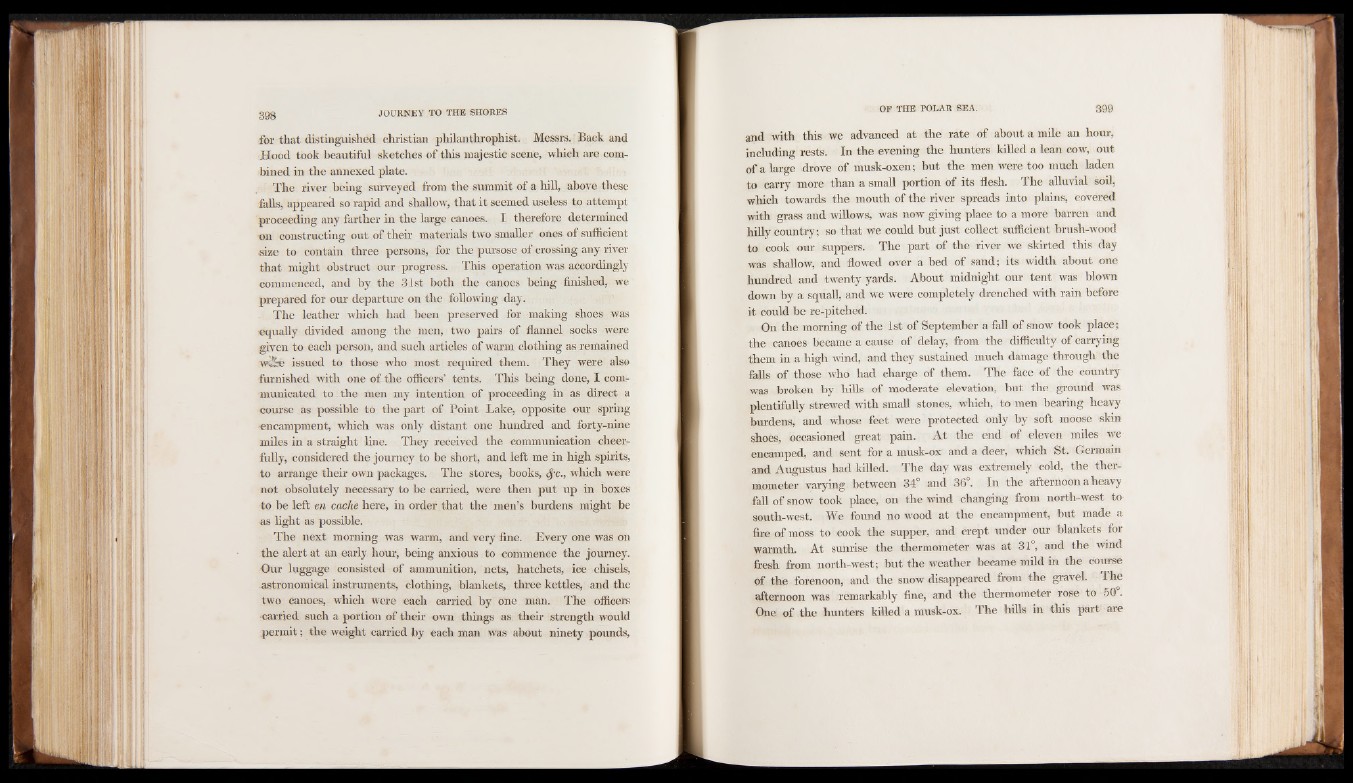
for that distinguished Christian philanthropist. Messrs. Back and
Hood took beautiful sketches of this majestic scene, which are combined
in the annexed plate.
The river being surveyed from the summit of a hill, above these
falls, appeared so rapid and shallow, that it seemed useless to attempt
proceeding any farther in the large canoes. I therefore determined
on constructing out of their materials two smaller ones of sufficient
size to contain three persons, for the pursose of crossing any river
that might obstruct our progress. This operation was accordingly
commenced, and by the 31st both the canoes being finished, we
prepared for our departure on the following day.
The leather which had been preserved for making shoes was
equally divided among the men, two pairs of flannel socks were
given to each person, and such articles of warm clothing as remained
w&e issued to those who most required them. They were also
furnished with one of the officers’ tents. This being done, I communicated
to the men my intention of proceeding in as direct a
course as possible to the part of Point Lake, opposite our spring
■ encampment, which was only distant one hundred and forty-nine
miles in a straight line. They received the communication cheerfully,
considered the journey to be short, and left me in high spirits,
to arrange their own packages. The stores, books, cfc., which were
not obsolutely necessary to be carried, were then put up in boxes
to be left en cache here, in order that the men’s burdens might be
as light as possible.
The next morning was warm, and very fine. Every one was on
the alert at an early hour, being anxious to commence the journey.
Our luggage consisted of ammunition, nets, hatchets, ice chisels,
astronomical instruments, clothing, blankets, three kettles, and the
two canoes, which were each carried by one man. The officers
carried such a portion of their own things as. their strength would
permit; the weight carried by each man was about ninety pounds,
and with this we advanced at the rate of about a mile an hour,
including rests. In the evening the hunters killed a lean cow, out
of a large drove of musk-oxen; but the men were too much laden
to carry more than a small portion of its flesh. The alluvial soil,
which towards the mouth of the river spreads into plains, covered
with grass and willows, was now giving place to a more barren and
hilly country; so that we could hut just collect sufficient brush-wood
to cook our suppers. The part of the river we skirted this day
was shallow, and flowed over a bed of sand; its width about one
hundred and twenty yards. About midnight our tent was blown
down by a squall, and we were completely drenched with rain before
it could be re-pitched.
On the morning of the 1st of September a fall of snow took place;
the canoes became a cause of delay, from the difficulty of carrying
them in a high wind, and they sustained much damage through the
falls of those who had charge of them. The face of the country
was broken by hills of moderate elevation, but the ground was
plentifully strewed with small stones, which, to men bearing heavy
burdens, and whose feet were protected only by soft moose skin
shoes, occasioned great pain. At the end of eleven miles we
encamped, and sent for a musk-ox and a deer, which St. Germain
and Augustus had killed. The day was extremely cold, the thermometer
varying between 34° and 36°. In the afternoon a heavy
fall of snow took place, on the wind changing from north-west to
south-west. We found no wood at the encampment, but made a
fire of moss to cook the supper, and crept under our blankets for
warmth. At sunrise the thermometer was at 31°, and the wind
fcesh from north-west; but the weather became mild in the course
of the forenoon, and the snow disappeared from the gravel. The
afternoon was remarkably fine, and the thermometer rose to 50 .
One of the hunters killed a musk-ox. The hills in this part are